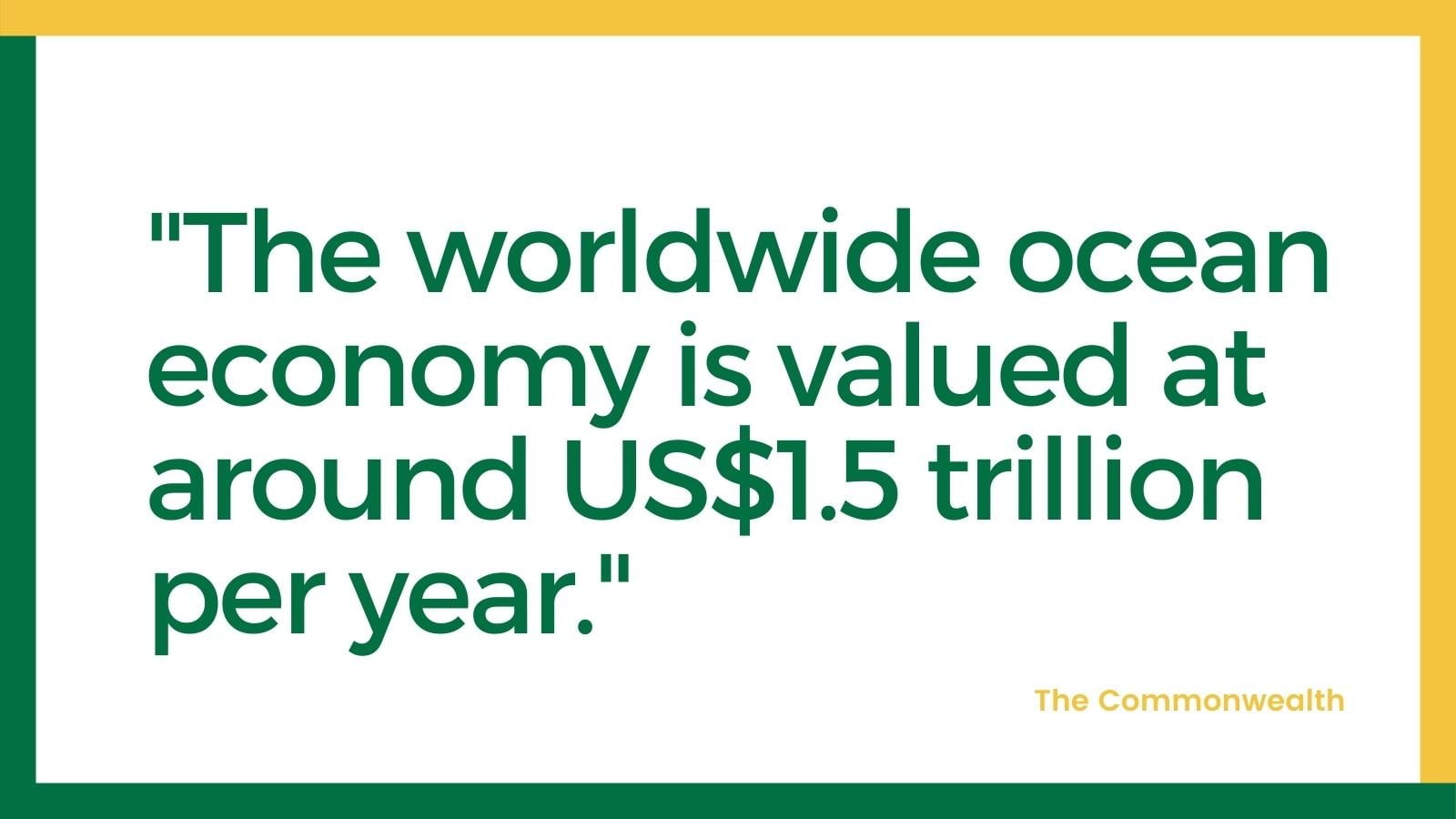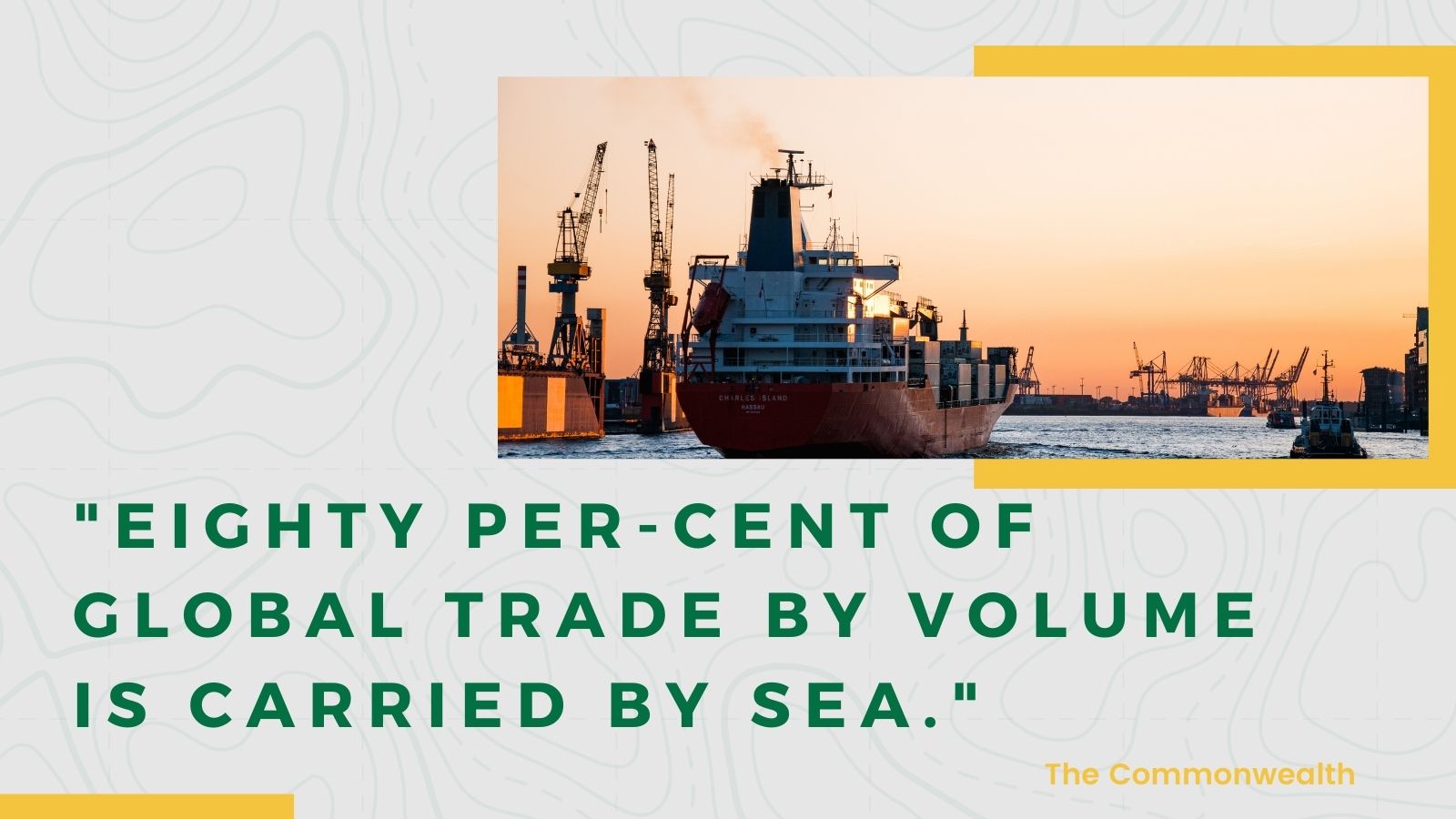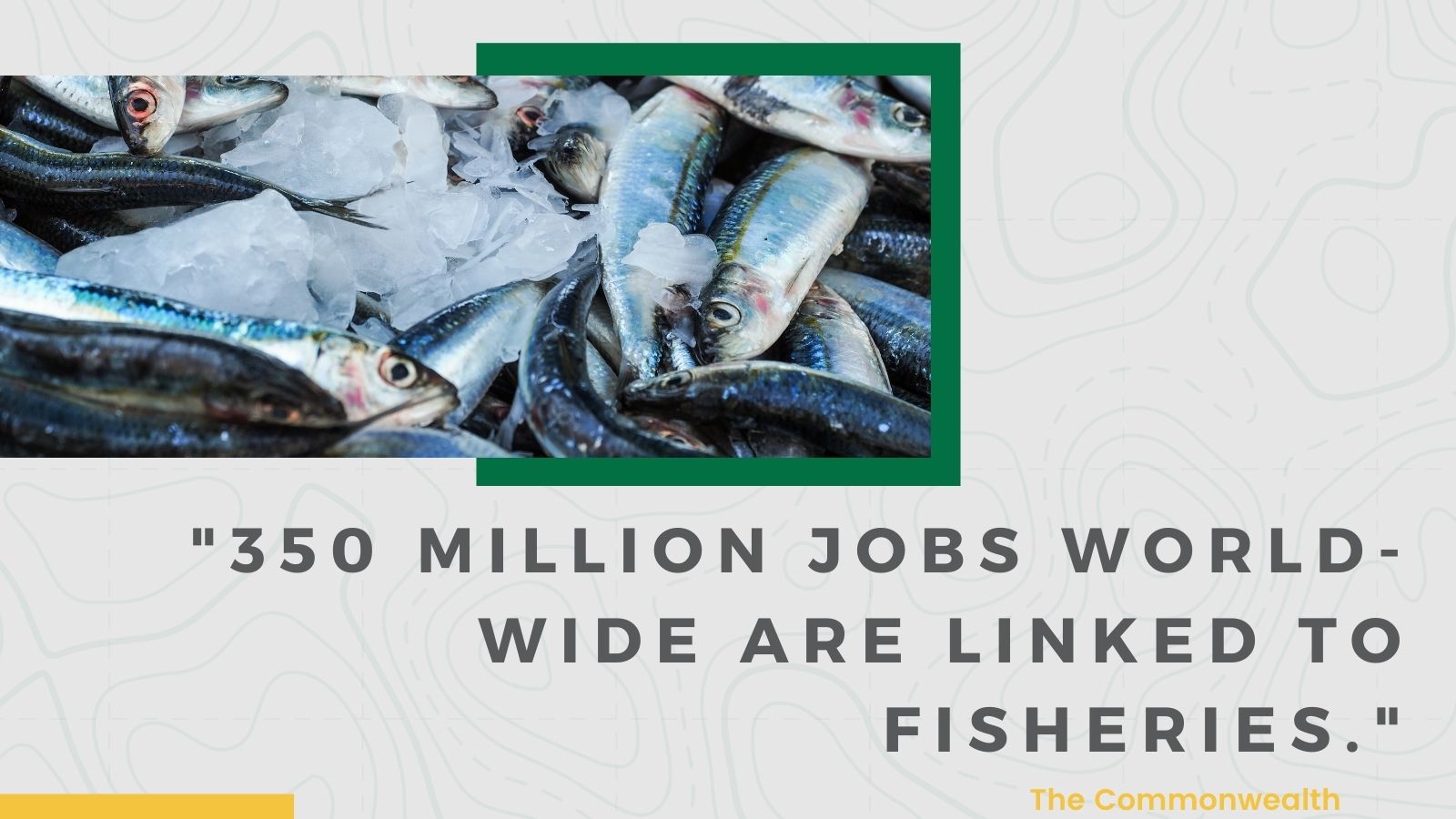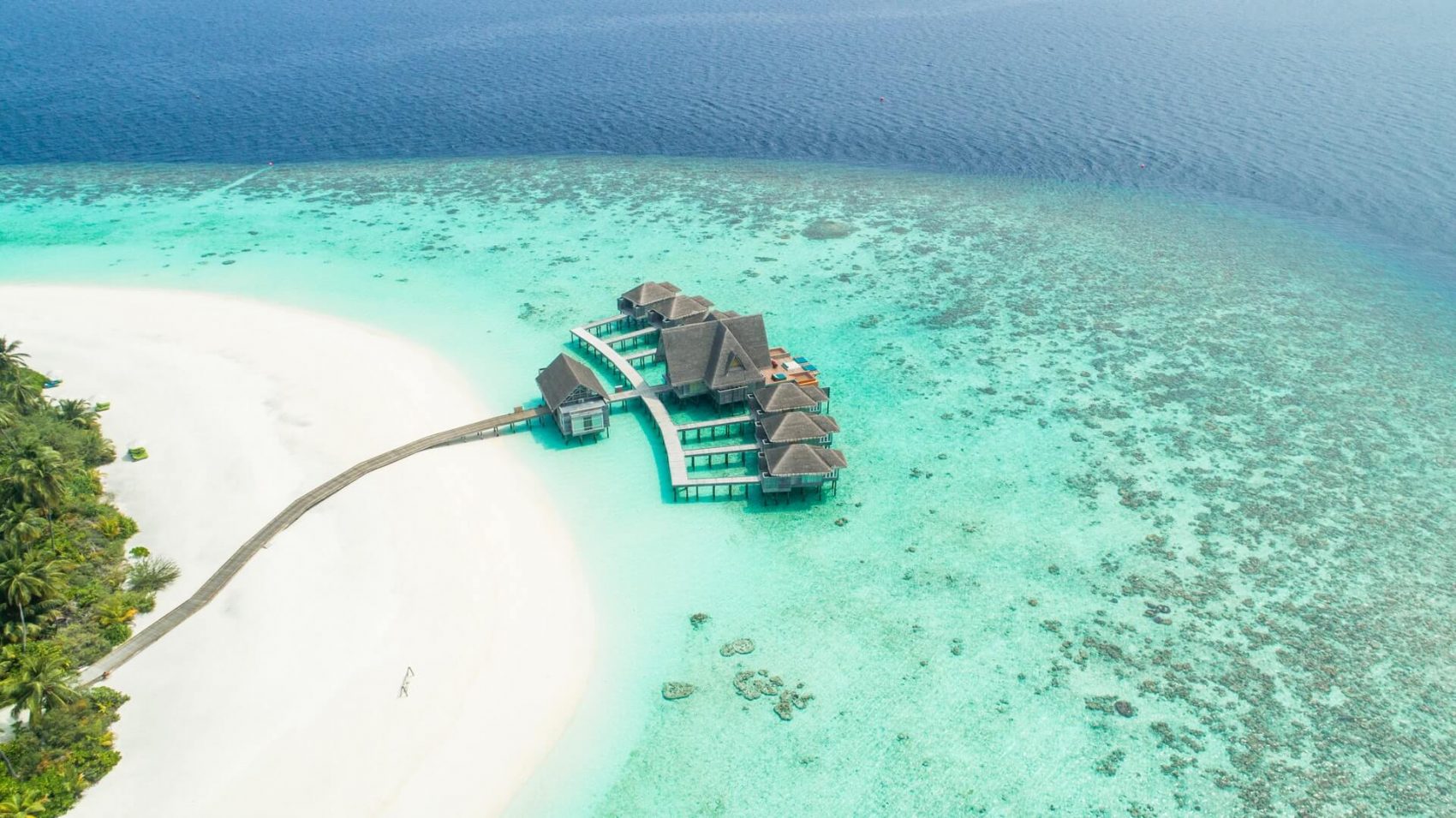A healthy ocean is vital to the livelihoods of billions of people, especially those living on islands and in coastal areas. Two-thirds of our planet is covered by water, and it is a key component of sustainable development. The health of our ocean is facing increasingly severe threats such as human-caused climate change, leading to rapidly warming ocean waters, overfishing, and growing levels of pollution, including massive quantities of single-use plastic. Protecting the ocean has never been more important!
Some statistics from The Commonwealth about the importance of the ocean for humanity:


Human caused threats to the ocean
Scientists warn that once the scale has been tipped too far, a chain of increasingly devastating disasters will be set in motion.
We are at risk of losing 90% of all corals worldwide in the next 30 years if temperatures continue to rise at the current rate. This will threaten the food and livelihoods of more than half a billion people! Many experts also warn that there could be more plastic than fish in our ocean in the next 30 years, if there is no significant action taken to mitigate this impending disaster. Furthermore, homes and businesses are at risk, as scientific models predict that rising sea levels are a significant threat to coastal cities around the world.
The background of the Blue Economy
The concept of the Blue Economy has emerged as a way to expand upon the Green Economy in a way that is more relevant to coastal countries and their inhabitants. The advancement of the Green Economy was one of two key themes that were focused upon at the “Rio +20” United Nations Conference on Sustainable Development (UNCSD) on 20-22 June 2012 in Rio de Janeiro, alongside the further refinement of the Institutional Framework for Sustainable Development.
Poverty eradication was re-emphasised at the UNCSD as its biggest challenge by the United Nations in its outcome document:
“Eradicating poverty is the greatest global challenge facing the world today and an indispensable requirement for sustainable development. In this regard we are committed to freeing humanity from poverty and hunger as a matter of urgency.”
(Para 2. The future we want. UNCSD 2012).
The applicability of the Green Economy was brought into question by many coastal countries, including Small Island Developing States (SIDS) for which the health of the ocean is crucial. There were substantial calls during the Rio +20 preparatory process for a “Blue Economy” approach to be considered. Rather than being an afterthought to other issues, such as protecting land ecosystems and poverty reduction, it was argued by coastal nations that maintaining and caring for the health of our ocean is of paramount importance to all global sustainability efforts and should be seen as equally important as the Green Economy (Blue Economy Concept Paper, UN, 2014)
Thankfully the UN and other major global institutions are now fully committed to the importance of protecting the ocean. This is especially important considering the threats mentioned earlier, combined with increasingly sophisticated technology that is allowing governments and corporations to exploit ocean resources at an ever greater and rapid scale.
Creating sustainable solutions is imperative to long-term solutions. The emergence of the sustainable Blue Economy is such a powerful and important idea and is hoped it will help to solve many impending crises.
Defining the Blue Economy
There is no one definition of the Blue Economy but a common theme exists between the interpretations; preserving the health of the ocean globally and achieving a sustainable future for humanity and Earth.
“The Blue Economy endorses the same principles of low carbon, resource efficiency and social inclusion, but it is grounded in a developing world context and fashioned to reflect the circumstances and needs of countries whose future resource base is marine.”
– Blue Economy Concept Paper, United Nations, January 2014
At the core of the Blue Economy concept is the urgent need to preserve the health of the ocean because of its huge importance to humanity, and the shared survival of all life on planet Earth. Billions of people around the world rely directly on the ocean for food and employment, so every country must work together collectively to cut down considerably on destructive practices and exploitation of ocean resources.
The concept provides humanity with a blueprint on how to better protect the ocean by fundamentally changing how we view it; rather than as a resource that can be destructively extracted from, it is a vital part of the global ecosystem that deserves sustainable stewardship to ensure it is healthy for future generations.
The importance of the Blue Economy is clear because of its positive implications in working towards the achievement of the Sustainable Development Goals, especially SDG 14: ‘Conserve and sustainably use the oceans, seas and marine resources for sustainable development’.
How can SIDS benefit from investing in the Blue Economy?
The United Nations lists a total of 58 Small Island Developing States (SIDS) which includes 38 UN members, and 20 non-UN members/associate members of regional commissions. SIDS are defined by several common characteristics and the challenges that they face. According to a report prepared for the UK Government’s Department for International Development (DFID), the characteristics they share include:
- “Small population sizes, and territories that are remotely located from economic markets, and whose people are often diffusely located within.”
- “Small, dispersed populations mean that domestic markets are small, and state capacity is limited.”
- Generally greater openness “to trade than other developing countries. This openness makes the SIDS particularly vulnerable to external economic conditions, of which they have no direct control.”
- “Narrowly based economies that depend on just a few products and sectors. Some SIDS are dependent on strategic imports – e.g. energy, fuel, food, and industrial supplies. Common growth sectors include: natural resources and tourism.”
- “SIDS are the most environmentally vulnerable of all developing countries. The climate crisis is making natural disasters more intense, and this looks set to continue.”
- “SIDS are particularly vulnerable to the climate crisis, and will continue to be among the earliest and most impacted countries. Many SIDS are vulnerable to sea-level rises and storms due to being low-lying. Some SIDS’ economies are dependent on one of the following sectors: public sector employment, agriculture, fishing and tourism. These sectors are often particularly hard hit by climate change.”
It cannot be emphasised enough how important a healthy ocean ecosystem is to the future success of SIDS. For a significant proportion of them, their populations depend heavily on food from the ocean for their major source of nutrition. This means that many of the local inhabitants are also employed in the sea-food industry to provide seafood products for sale locally and/or abroad.

Over fishing through the use of unsustainable fishing practices and technology can lead to the depletion of fish and other ocean animal species, potentially leading to a near or total collapse in stock levels. This can have devastating consequences on local food sources, as well as local businesses.
Large numbers of SIDS inhabitants live and/or run businesses within close proximity to the coast. Many SIDS are also highly dependent on tourism, such as Seychelles, the Maldives and the majority of the island nations in the Caribbean. Rising sea levels caused by global warming will affect millions of people’s homes and businesses. Tourists head to island nations such as the Maldives, St Lucia and Barbados, not only for the warm, sunny climate but also to enjoy the beaches and swim in clear blue waters. The beaches and waters surrounding SIDS have been under an increasingly growing threat in recent years from man-made pollution, especially single-use plastic, much of which comes from products used within resorts, hotels and other businesses catering to tourists.
The majority of SIDS also rely heavily on imported fossil fuels such as oil and gas to generate power for homes, businesses and transport. It is the high fuel transportation costs that mean that the cost of energy services in SIDS are among the highest in the world, with island states spending over 67 million USD per day on oil. The cost of fuel imports are equal to between 12 and 37% of total imports. This means that SIDS have extremely high energy costs and levels of energy vulnerability in comparison to other states across the world (World Bank, 2014). This creates a vicious cycle for SIDS because as they continue to rely on hugely expensive fossil fuel imports, this reduces their ability to invest in more renewable forms of energy, as well as sustainable infrastructure and jobs for their inhabitants. Burning fossil fuels for energy also creates greenhouse gases, leading to further sea-level rises, putting SIDS inhabitants at further risk.
The food sources of SIDS, as well as their natural beauty which attracts millions of tourists, are also at risk from disasters associated with oil spills. For example, in 2020 there was a serious and devastating oil spill off the coast of Mauritius which occurred close to the Blue Bay Marine Park Reserve, a wetland of international importance, and two environmentally protected marine ecosystems. “Although previous oil spills around the world have not been in as environmentally sensitive areas, they have still significantly affected marine animals and plants. In 2010, the Deep Water Horizon incident off the Gulf of Mexico saw nearly 400,000 tonnes of oil spill, resulting in the death of thousands of species ranging from plankton to dolphins.” (BBC)
One very important way of being able to achieve this transition that has been proposed by several island leaders and experts is for a paradigm shift to take place in the way that SIDS inhabitants view their place in the world and are framed by others. Rather than being seen as tiny landmasses surrounded by a vast ocean, with little significance on the global stage, instead, there is a growing movement proposing that SIDS should be viewed as “large ocean states”, with equal importance to states with larger areas of land. This shift in status will significantly challenge the current status quo, ideally giving SIDS more agency and power over their resources and futures.
“We may be small island developing states, but we are also large ocean developing states. We are a lot bigger than we think we are. To ignore our vast seascape and its tremendous potential, is developmental malpractice. We must cast our eyes outward and recognise that the beach or the coastline, is not the edge of our world but the beginning of the immense untapped resource that can sustainably fuel our growth and development.”
– Hon. Camillo Gonsalves – Minister of Finance, Economic Planning, Sustainable Development and Information Technology of St. Vincent and the Grenadines.
By switching from the use of unsustainable fossil fuels to power homes, businesses and transport, to sustainable forms of renewable energy such as solar, wind and tidal, SIDS will experience a range of benefits. They will become energy self-sufficient, thus cutting out the need to import fuel. Instead, they can generate their power using renewable sources which is both much cleaner and also a lot cheaper in the long run. The substantial long term savings can then be reinvested back into the local economy to fund public services. SIDS will also be cutting down on their own fossil fuel emissions, thus setting an example for the world, as well as massively reducing the risk of devastating oil spills.
By cutting down on or banning destructive industrial fishing techniques such as giant trawlers with vast fishing nets operating in their territorial waters, SIDS can help their seafood stocks to replenish and thrive. This will ensure the long term survival and replenishment of local seafood stocks, vital for both local nutritional levels and local businesses. In addition to this protected areas can be established, where sea life levels are allowed to replenish for several months each year before locals are allowed to fish there. This also means that fish stocks will not be at such a substantial risk of becoming depleted and are more likely to rebound.
Single-use plastics are a huge problem for many of the SIDS, for example:
“Of the top thirty global polluters per capita, ten are from the Caribbean region. These are Trinidad & Tobago, Antigua & Barbuda, St. Kitts & Nevis, Guyana, Barbados, St. Lucia, Bahamas, Grenada, Anguilla and Aruba; and every year, these ten island nations generate more plastic debris than the weight of 20,000 space shuttles.” (Forbes, 2019).
This is not only a problem for the SIDS of the Caribbean region either, with the Maldives recording the highest level of microplastic pollution on the planet (Phys.org, 2020). This pollution presents a huge threat to local food sources as well as local wildlife in general, such as turtles, birds and dolphins. Additionally, it will undoubtedly lead to the erosion of the image of these SIDS and others as places of natural beauty, with pristine beaches and crystal clear water, if this issue is allowed to persist. Instead, bans on single-use plastic and other destructive waste are urgently needed.
Blue Economy success stories
Protection of fishing grounds through short-term temporary closure
The protection of marine fish stocks is an admirable goal, but it is often difficult to successfully implement. Governments often try to protect marine wildlife by introducing outright bans on fishing in large areas along their coasts. Most of these protective measures fail though because local people, who are often very poor, rely on fishing for their food and livelihoods. The temptation to carry on fishing, despite the bans is too great, especially when both feeding their families and earning an income is dependent on catching fish.
An alternative approach to an outright fishing ban has been trialled to great success in some parts of the world by the charity Blue Ventures Conservation. They help coastal communities to overcome this issue, by implementing the closure of fishing grounds for short periods to increase catches. The local leadership then becomes inspired to preserve marine biodiversity and improve the area’s food security, as the closures provide economic rewards that exceed expectations, within reasonable timeframes for traditional fishers.
The first time the charity tested this approach was over a decade ago in one village in southwest Madagascar, where the local coastal community was concerned about the continued decline of their fisheries. The results of this trial were a fantastic success, in terms of increased numbers of octopus caught and fisher incomes.
This has inspired communities in neighbouring areas to also switch to this approach:
“This use of short-term fishing ground closures as a point of entry for conservation has since gone viral along hundreds of kilometres of Madagascar’s coastline, inspiring a grassroots marine management movement that has seen 65 LMMAs established to date, covering 11% of the island’s seabed.” (Blue Ventures)
While Madagascar is not itself classed within the SIDS category, this is a method that could be used by fishers there to protect their fish stocks, by helping them rebound, and grow their incomes.
Banning of single-use plastics in Jamaica
As mentioned earlier, the Caribbean, along with SIDS in general, have been hugely affected by vast quantities of single-use plastic polluting their beaches, the ocean and killing local wildlife. This was certainly the case for Jamaica, so to fight back against this growing problem, the government decided to implement the first stage of a ban on single-use plastics in 2019.
The Jamaica Observer has said that they have been “especially pleased with the ban on single-use plastics implemented in 2019, which, looking back, has probably gone better than many expected”.
This June, the Jamaican government intends to begin the third stage of the ban on single-use plastic. According to Mr Pearnel Charles, the minister with responsibility for the environment and climate change:
“It is expected that the private sector will deplete/replace all affected products currently circulated in the trade and ensure that their production processes are retrofitted, as appropriate, to facilitate compliance with the provisions of the ban.”
To ensure the ban is a continued success there will be an increased level of education provided to increase awareness of the ban and its benefits, as well the threat of prosecutions for those that break the new law.
So far, Jamaica has provided an excellent example of how SIDS can implement a single-use plastic ban to ensure the protection of their Blue Economy. Several other countries in the Caribbean have also begun putting in place their own bans, although implementation remains an issue in some cases.
Many other SIDS countries across the world have also decided to take this approach to safeguard their environment, citizens and economy, including the Maldives which announced a phased ban too.
“We are seeking to completely phase out our usage of single-use plastic by the year 2023. This will be one of the most far-reaching and ambitious plastics phase-out plans of any nation on Earth”
– Ibrahim Mohamed Solih, President of the Maldives.
Island Innovation and the Blue Economy
Here at Island Innovation, we are very positive about the future social, environmental and economic prospects of SIDS, as they start to implement their own projects to protect the Blue Economy. This all very much in line with our support for the Sustainable Development Goals (SDGs). These measures can include those mentioned above, as well as a variety of others like “blue financing” which involves combining responsible private investments with the world of marine conservation to benefit local communities. This will create jobs in renewable energy, aquaculture and renewable energies, while also protecting the environment.
To find out more about the Blue Economy, make sure to join us at the Island Finance Forum 2021 (13-16th April) where one of our key topics will be ‘Climate Change, the Blue Economy and Natural Capital.’ You can register for the IFF2021 here: https://islandinnovation.co/finance-forum-2021/




